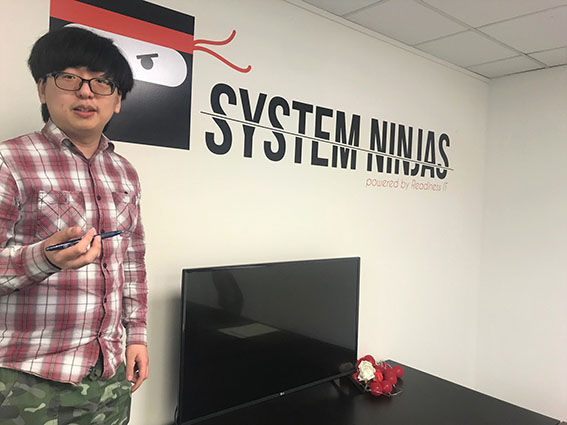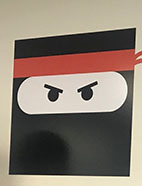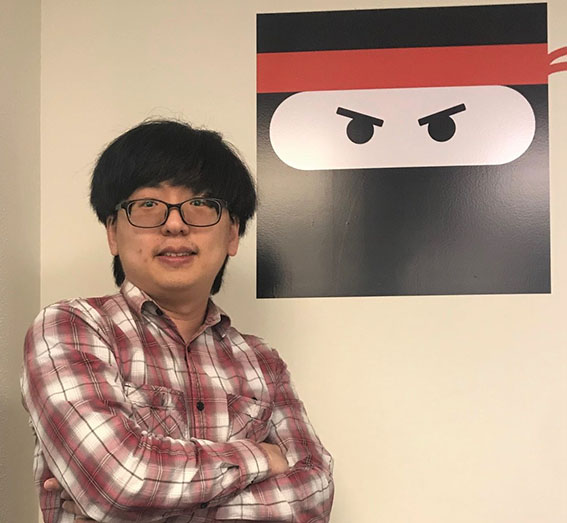Systems Ninja - what sort of job is that?

When you hear the word ‘ninja’ what do you think of? People swooping around doing stealthy karate chops in dark outfits – or teenage mutant turtles called Michelangelo and Donatello eating pizza? I bet you’re not thinking of Systems Ninjas; techie trainees learning how to code without any strange outfits or medieval names?
It was the unconventional title of systems ninja that attracted AUT alumni Brian Kong to look closely at the job description when he saw it on a job board while searching for IT roles.
“I liked the idea that Readiness IT was not using traditional titles which suggested that they are more modern and open minded and would not be putting me in a box,” he explains. And the role has turned out to be a great fit for Brian, without any need to dress up or learn martial arts moves.
So what does a systems ninja do?
Systems ninja roles are similar to an IT paid internship, with system ninjas receiving mentoring from experts within the company who give directions, tutor and help the system ninjas through problems. As a systems ninja, Brian is training to be a full-stack developer - the techies who look after the front and back end of a system, such as a website. The role is varied. Some days he’s working on his own, other days within a team that could be made up of people based around the globe.
“Currently I am supporting, building and debugging the system of a project. I find it exciting because we impact on more than 50 million users worldwide, including Ericsson, Spark, Oracle, and BMW,” says Brian.
Readiness IT, the company behind this approach to traineeships, is a global company that works on telecommunication digital transformation projects. The company's headquarters are in Portugal and they've had offices in New Zealand since 2015.
Satisfying and fun
Brian loves the role because it gives him plenty of opportunity to program.
“To be honest, I love programming including C#, JAVA, Python, Angular, etc. and this 'system ninja' role includes comparable concepts of all of them as well as full-stack development technology.”
He says it is very satisfying to do something in the back end of the system that then changes something positively on screen. “When a little bit of coding makes a client’s company more efficient or improves their profit, I feel really good.”
Currently there are seven systems ninjas in Auckland at Readiness IT. The system ninjas do impact analysis, software development, and validation of software. Their work includes helping clients find the most appropriate technologies for their needs and then supporting their use of those technologies, such as with digital services and application development management. They work with other development teams to create cohesive software, working closely with managers and integration specialists
Ninja mentors
Every system ninja has a mentor, an expert with more than 15 years of experience in the telecommunication field, who supports their development by creating individual plans to develop the personal and technical skills required, and preparing the ninjas for ‘final missions’. This training is delivered through a dojo, an online space where mentors help systems ninjas with their training and learning.
Working with a mentor has been a strange but positive experience, says Brian.
“It is truly amazing that there is someone to guide me and let me get into the right place, gain the right knowledge and give me feedback. I really appreciate that about Readiness IT and the system ninja role.”
Brian adds if he gets something wrong, he can go directly to his mentor for feedback and solutions.
“All my tricky questions can be answered by the mentor.”
What is a typical day like?
Brian is in the office by 9am and generally leaves around 6pm.
“We work hard but we are able to chill out during the day by playing computer games for a few minutes, as well as the usual coffee and lunch breaks.”
He generally starts the day with a remote meeting with his mentor who is based at Readiness IT headquarters in Portugal.
Brian’s background
Brian, who was brought up in South Korea, created a simple computer game when he was 14. It was that game that opened his mind to the possibilities of a career in programming.
“I loved producing the game and playing it with friends. That was the starting point for me. I started learned programming at high school, then left school and got a programming job.”
After working a year in South Korea, he moved to New Zealand to join his family who had already emigrated here. He spent three years working in a small company in New Zealand before deciding to enrol into a double degree in software development and computer science at AUT.
Finding a graduate role
Brian, along with many others, started looking for a graduate programming role in the middle of Covid 19. It was a struggle for him and his friends but they all did what they could to keep afloat. Brian worked as a casual cleaner and helped a friend develop a fishing competition app – a project he continues to work on. He also volunteered with the local Korean Society, helping with their invoicing as well as tutoring older people in the Korean community on how to use IT.
Landing a systems ninja role wasn't easy. Brian missed out when he first applied to Readiness IT. "Then boom, this job opportunity came up. What I learned from my experience is to never give up. When you fail, don't give up, just keep trying to improve."
And don't dismiss unusual job titles - this one has been a winner!
Tips from Brian about the workplace
- Don’t let a job title put you off.
- You need to keep learning, especially in IT. If you keep learning, studying or trying something new, you don’t fall to the back.
- Be you. Some people act differently when they start a job. You want to make sure people see you as you are. Otherwise when you get stressed it can be difficult to keep pretending. Don’t be rude but don’t act.
- Be positive and try and accept feedback because it is good for us. I was very shy and got feedback early in my first New Zealand job that I was seen as negative and not wanting to be there because I wasn’t saying hello or chatting to my work colleagues. I hadn’t realised I needed to try and connect more.
Want help with finding the perfect job for you or help to demystify a job title?
Come and have a chat to us at the Employability Lab or sign into elabonline and look for events and workshops to help you.
Written by Angela McCarthy, AUT Employability and Careers writer
CVs/Cover letters
- 7 Tips on creating a great CV
- Personal Statement? Career Objective? What?
- Why bother with LinkedIn?
- Why bother to write a cover letter?
Job search skills
Career advice
- Bringing passion into the mix
- Don't let rejection end your dream
- Employability Skills - how to figure them out!